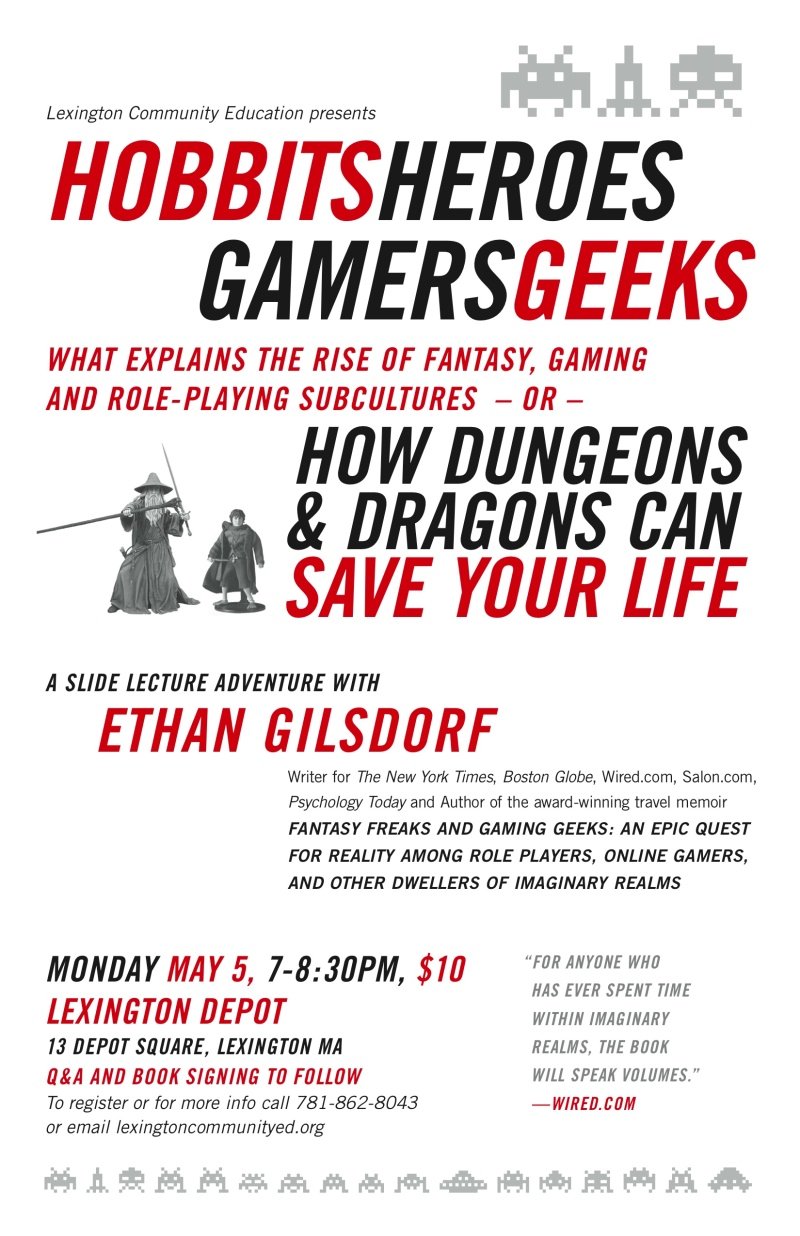Pilgrim for a Day
I'm going to be a Pilgrim for a Day! On Mon June 16, noon-1, join me and deputy director of Plimoth Plantation Richard Pickering, for a Google Hangout live-cast and witness my transformation into 17th-Century Pilgrim, Stephen Deane.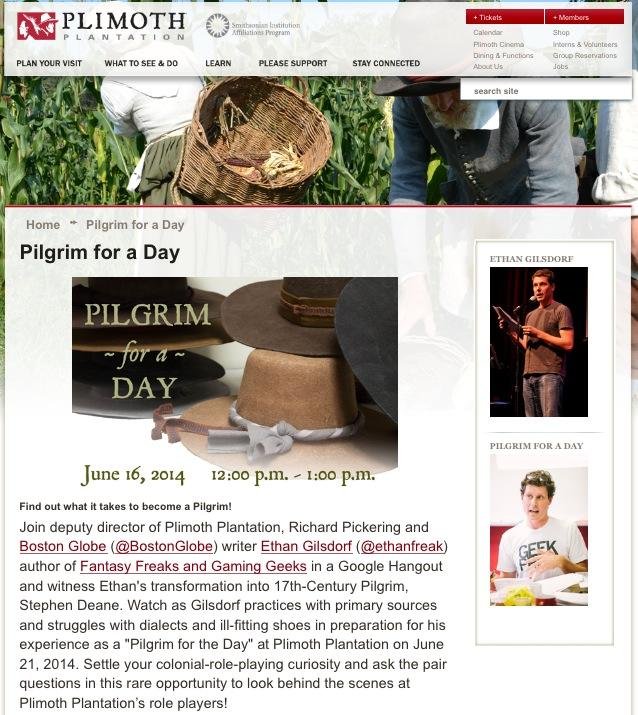

I'm going to be a Pilgrim for a Day! On Mon June 16, noon-1, join me and deputy director of Plimoth Plantation Richard Pickering, for a Google Hangout live-cast and witness my transformation into 17th-Century Pilgrim, Stephen Deane. Watch me struggle with a period dialect and ill-fitting shoes in preparation for my live role-play experience on site at Plimoth on June 21. It's all for Boston Gloibe story I'm writing.
Settle your colonial-role-playing curiosity and ask us questions in this rare opportunity to look behind the scenes at Plimoth Plantation’s role players!
More info on how to participate here http://www.plimoth.org/pilgrimforaday
June/July classes at Grub Street
Here is the current schedule of adult writing workskops and seminars I'm offering at Grub Street (in Boston) this summer. These are open the public and do not require enrollment in a degree program.
Some of these are part of my Freelance Essentials Series, which teaches students the skills and craft to become working freelance journalists Details and registration information here.
Hope to see you in the classroom!
Freelance Essentials: Navigating the Freelancer's Market in Boston
4 Wednesdays from 6:00-9:00pm, starting June 4th
Freelance Essentials: The Ethics, Practice and Business of the Freelance Life
Tuesday, June 10th, 6:00-9:00pm
Kickstart Your Writing Mojo with A Random Exercise
Friday, June 20th, from 10:00am-5:00pm
Freelance Essentials: Writing Commentaries, Op-eds & Personal Essays for Publication
6 Tuesdays from 10:30am-1:30pm, starting June 24th
Workshop That Pitch Letter!
Friday, June 27th, 10:00am-5:00pm
Freelance Essentials: Gonzo, Stunt and Immersion Writing Boot Camp
Saturday, June 28th, 10:00am-5:00pm
Freelance Essentials: Freelance Writing 101
Saturday, July 12th, 10:00am-5:00pm
More details and registration info here.
200 People Singing Happy 40th Birthday Dungeons & Dragons
D&D turned 40 this year. To honor that, at PAX East 2014 (in Boston), I was part of a panel called "Why D&D Is Still Awesome: A 40th Anniversary Dungeons & Dragons Tribute."
But that didn't seem enough. I tried (and failed) to make a giant 40-sided die birthday cake. Instead, I lead the 200+ person crowd in a rousing "Happy Birthday to Dungeons & Dragons" singalong.
With David Ewalt, author of Of Dice and Men: The Story of Dungeons & Dragons and The People Who Play It and and Jon Peterson, author of Playing at the World: A History of Simulating Wars, People and Fantastic Adventures, from Chess to Role-Playing Games.
Help, My Computer Is Turning Me Into A Robot

The first three months of 2014 have given us three momentous milestones in technology. There was the 30th anniversary of the Macintosh personal computer back in January. Then came the 10th birthday of Facebook in February. March celebrated 25 years since the beginning of the World Wide Web.
These technologies have made us more connected, more adept, more independent and more informed. Seemingly overnight, they’ve become irreplaceable tools for the workplace and for leisure, allowing us to do things we’d previously never dreamed possible: send messages at the blink of an eye, search vast databases from our homes and offices, and store vast amounts of information. Computers, social media and the Web have unleashed a powerful, creative DIY force. We are now our own secretaries, publishers and number-crunchers. We are indeed powerful.
But to what end?
Much has been written about technology’s downside. Largely, that critique centers on its de-socializing effects. The Internet and our smart devices distract us, and addict us. They tempt us to not “be present” in real world space. I often feel these things to be true. But my take on the dehumanizing aspects of digital technology is somewhat different.
My fear is this: Has my trusty and seemingly innocuous MacBook Air made me more robot-like? Have our computers turned us into them?
Dune is in Your Head
If you've ever seen the 1984 David Lynch film version of Dune, or the three-part TV mini-series from 2000, you know that both adaptations of Frank Herbert's classic sci-fi novel left plenty of his world on the cutting room floor --- and left something to be desired.

If you've ever seen the 1984 David Lynch film version of Dune, or the three-part TV mini-series from 2000, you know that both adaptations of Frank Herbert's classic sci-fi novel left plenty of his world on the cutting room floor --- and left something to be desired.
But what if there was one version of Dune that would have blown the minds of critics before they had a chance to grumble?
In this story for BoingBoing, "Dune is in Your Head: The mirage of Jodorowsky’s Unfilmed Epic," I delve into the history of director Alejandro Jodorowsky's version of Dune, the one that was never made, and the one now captured in a terrific documentary called Jodorowsky's Dune.
Below, a couple of the production stills from the never realized film.
 Concept art by Swiss artist H.R. Giger. All photos courtesy of Sony Pictures Classics
Concept art by Swiss artist H.R. Giger. All photos courtesy of Sony Pictures Classics
 Storyboard of Dune, art by Jean Giraud, aka French comic book artist Moebius(Photo: David Cavallo) All photos courtesy of Sony Pictures Classics
Storyboard of Dune, art by Jean Giraud, aka French comic book artist Moebius(Photo: David Cavallo) All photos courtesy of Sony Pictures Classics
Hollywood, ditch the childhood nostalgia trip
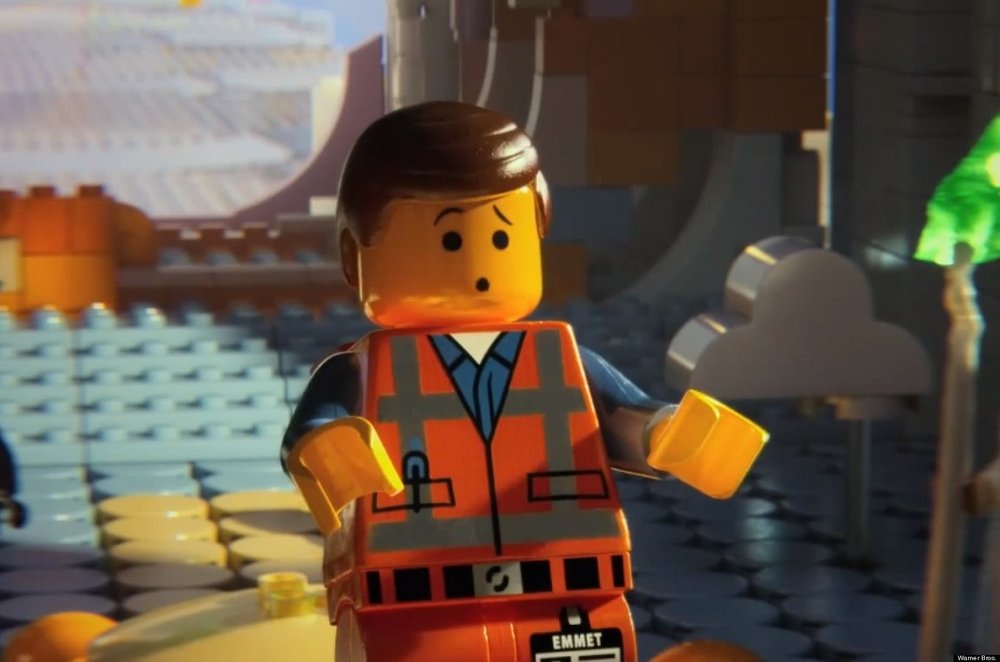 I had a piece in USA Today today about Hollywood and Madison Avenue resurrecting dead franchises from the hoary childhoods of Gen Xers.
I had a piece in USA Today today about Hollywood and Madison Avenue resurrecting dead franchises from the hoary childhoods of Gen Xers.
 I had a piece in USA Today today, about Hollywood and Madison Avenue resurrecting dead franchises --- Battleship, Transformers, Dr. Seuss' The Lorax, GI Joe, The Lego Movie, Mr. Peabody & Sherman, Muppets Most Wanted, Peanuts -- from the hoary childhoods of Gen Xers. Yes, the movies have been busy trolling the deep sea waters of our collective nostalgia for childhood media. Seeking the next franchise, they dredge up another toy or TV show to see whether new life can be breathed into it for another generation's pleasure.
I had a piece in USA Today today, about Hollywood and Madison Avenue resurrecting dead franchises --- Battleship, Transformers, Dr. Seuss' The Lorax, GI Joe, The Lego Movie, Mr. Peabody & Sherman, Muppets Most Wanted, Peanuts -- from the hoary childhoods of Gen Xers. Yes, the movies have been busy trolling the deep sea waters of our collective nostalgia for childhood media. Seeking the next franchise, they dredge up another toy or TV show to see whether new life can be breathed into it for another generation's pleasure.
How about some edgier Muppet movies?

A post about possible alternative Muppet movies, from “The Muppets’ Rings of the Lord” and “The Muppets’ End of the World” to “The Muppets Go Psycho” and “The Muppets Greatest Story Ever Told.” You might have better ideas.
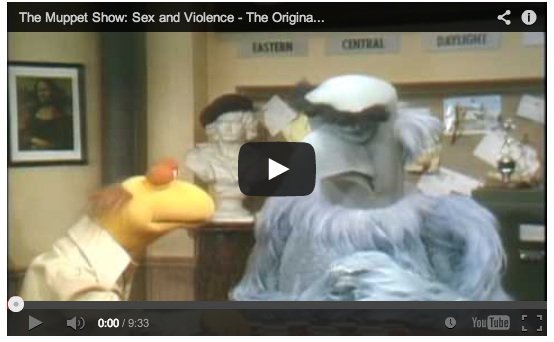 I enjoyed putting together this post about possible alternative Muppet movies, from “The Muppets’ Rings of the Lord” and “The Muppets’ End of the World” to “The Muppets Go Psycho” and “The Muppets Greatest Story Ever Told.” You might have better ideas.
I enjoyed putting together this post about possible alternative Muppet movies, from “The Muppets’ Rings of the Lord” and “The Muppets’ End of the World” to “The Muppets Go Psycho” and “The Muppets Greatest Story Ever Told.” You might have better ideas.
... what if these puppets explored other Hollywood tropes and genres—more risky ones at that? There’s some slim precedent for this frog’s leap into more adult themes: The Muppets took on the Seven Deadly Sins and other more prurient themes in a weird 1975 TV special called “The Muppet Show: Sex and Violence.”
Read the rest on WBUR's The ARTery

A 2006 Interview with Ralph Bakshi
 Bakshi in the 1970s.
Speaking of unearthed treasures from the past, I just unearthed this 2006 interview I did with legendary experimental animator Ralph Baskhi.
Bakshi in the 1970s.
Speaking of unearthed treasures from the past, I just unearthed this 2006 interview I did with legendary experimental animator Ralph Baskhi. I recently wrote about him in connection with new, unearthed footage from his Lord of the Rings adaptation.
I hope you enjoy.
 Ralph Bakshi in 2009 (Wikimedia Commons)Speaking of unearthed treasures from the past, I just unearthed this 2006 interview I did with legendary experimental animator Ralph Baskhi. I recently wrote about him in connection with new, unearthed footage from his Lord of the Rings adaptation. I hope you enjoy.
Ralph Bakshi in 2009 (Wikimedia Commons)Speaking of unearthed treasures from the past, I just unearthed this 2006 interview I did with legendary experimental animator Ralph Baskhi. I recently wrote about him in connection with new, unearthed footage from his Lord of the Rings adaptation. I hope you enjoy.
An interview with Ralph Bakshi
by Ethan Gilsdorf
[November 2006]
Ralph Bakshi, pioneer of trippy, controversial cartoons with adult themes, has always been able to make films on the cheap. But lately, Bakshi has learned frugality doesn't open doors in Hollywood. Nor does the title 'legendary independent animator': Bakshi hasn't been able to get studios interested in his latest project, the "The Last Days of Coney Island," budgeted at a mere $5 million.
Yet computers may save him. For Bakshi, the promise of low-cost technology is that it could allow outsider animation to rise again. His new Bakshi School of Animation and Cartooning, based in Silver City, New Mexico, teaches a hybrid of old techniques: hand-drawn 2-D, processed in computers using relatively inexpensive software like Toon Boom.
Ralph Bakshi was born in October 1938 in Haifa, Israel. In 1939 his family came to New York escaping the war. He grew up in Brooklyn and went to the High School of Industrial Arts, now called High School of Art & Design. His first animation job was with Terrytoons Animation Studios, where he upset the status quo by becoming an animator on Mighty Mouse and Heckle & Jeckle shorts without working his way up the ranks. He started his own production company in the late 1960s, and in 1972 he finished his first feature, "Fritz the Cat,' the first cartoon ever given an X-rating.
 He went on to direct 'Heavy Traffic' (1973), which screened at the Museum of Modern Art. With this film he began his trademark mix of live action, animation, and animating characters against a backdrop of still photos, a technique continued in the controversial 'Coonskin' (1975). 'Wizards' (1977) was his first film extensively using rotoscoping (using live footage as a guide for animation). 'The Lord of the Rings' (1978), 'American Pop' (1981) and 'Fire and Ice' (1983) were his last major works before returning to TV and 'Mighty Mouse' shorts in the late 1980s. But a frustrating battle with Hollywood over 'Cool World' (1993) began his disenchantment with full-length production.
He went on to direct 'Heavy Traffic' (1973), which screened at the Museum of Modern Art. With this film he began his trademark mix of live action, animation, and animating characters against a backdrop of still photos, a technique continued in the controversial 'Coonskin' (1975). 'Wizards' (1977) was his first film extensively using rotoscoping (using live footage as a guide for animation). 'The Lord of the Rings' (1978), 'American Pop' (1981) and 'Fire and Ice' (1983) were his last major works before returning to TV and 'Mighty Mouse' shorts in the late 1980s. But a frustrating battle with Hollywood over 'Cool World' (1993) began his disenchantment with full-length production.
Bakshi spoke via telephone from Silver City, New Mexico. Among the many issues on his mind was the future of outspoken and edgy animation in the United States.
Ethan Gilsdorf: It seems that independent, feature-length animation for adults doesn't even it exist any more.
Ralph Bakshi: I have a very strong feeling about that. First of all, it's very complicated. The companies that are doing animated films right now are very huge companies. They have lots of money invested in technology. They spend so much money on their films that have to make huge grosses to make back their investment. A guy like me is very dangerous to them.
Gilsdorf: My sense of full-length animation is it's booming, but it's all being marketed to kids, other than films like 'Corpse Bride,' 'Nightmare before Christmas,' and 'Final Fantasy' (which is based on video game). Other than foreign films like 'The Triplets of Belleville,' animation for adults is really just special effects sequences in live action fantasy/sci fi/adventure movies.
Bakshi: Tim Burton is naturally making films his way. He's being very true to himself. That's his style of humor. But he gets to make the films because his other films are so successful. Tim Burton worked with me on 'Lord of the Rings.' It was his first job out of college, I hired him. He used to paint cels. He's being very honest as a filmmakers; he's not making what people want to see. He's making what he wants to see. But you go to Hollywood and mention Tim Burton in relation to Ralph Bakshi and people will say, 'Well that's Tim Burton.' I liked 'Triplets of Belleville.' I'm using more live action than 'Belleville' [in the 'Last Days of Coney Island'].
Gilsdorf: How have you adapted to the new climate?
Bakshi: I went out the Hollywood a couple of years ago. I thought, my budget was $5 million, I could go anywhere. I thought it was a slam dunk. They all wanted me to get involved in computer animated films. But no one would dare to buy it ['The Last Days of Coney Island']. I had about eight minutes of film and a completed script. I thought budget was a slam dunk. For a Bakshi comeback film, it seemed like a no-brainer. I tried for about a year. The structure of Hollywood had become very strong there was no way in. My freedom I had in the 1970s I took for granted. [Today, it's all the] business approach to animation. No one wants to do anything else. I could become a threat if I could make a profit with a $5 million film. I grew up feeling like a $30 million gross was a lot of money. It IS a lot of money [he laughs like a cartoon character]. I come from the old school. If you make $5 million profit that was a lot of money.
 Bakshi in the 1970s.
Bakshi in the 1970s.
[Hollywood] doesn't have the same business [system] as I was when a young man. With 'Coney Island,' the budget was still low. I asked one guy, should I have a budget of $150 million and pocket the rest? He said yeah, but you have to make [the movie] PG.
Gilsdorf: Sounds like a real attitude change. It's all about the money now.
Bakshi: Who runs these companies? I grew up being animator, Disney grew up as an animator. I grew up at time when the man who ran the animation company was a animator. He had hands in a production background. [These days] these companies are all run by people who don't have a production background.
Gilsdorf: This recent Hollywood experience must have changed your outlook on making animated features.
Bakshi: What they'd done is taken a lot of freedom away from me, from filmmakers who want to make personal films. [So] I went back to painting and drawing. I'm still doing film, slowly.
Gilsdorf: Do you think the digital revolution will help your comeback?
Bakshi: Everyone wants to do computer animation. It's not because I'm against it, I just don't want to do it. I don't think any one style is the answer to any film. One style doesn't stop the other. Computers don't kill hand drawn film. It's just a technique, a preference. It's like saying acrylic paint is going to kill oil paint.
Gilsdorf: What do you think of CGI techniques?
Bakshi: I saw 'War of the Worlds.' I think what they're doing with special effects is amazing. It's very close to magic. Let's not confuse my personal taste in animation with special effects in motion pictures. When an entire building collapses and explodes [as in 'War of the Worlds'], and thousands of men in armies attacks each other [like 'The Lord of the Rings'], that's amazing. I just don't think that's for animation.
Gilsdorf: And your opinion of digital rotoscoping like in 'A Scanner Darkly' and 'Waking Life,' by Richard Linklater?
Bakshi: I don't want to talk about it. I don't want to put the guy down. The guy's trying. I gave up on rotoscope because I don't like it. I don't want to do that look. It's cold. It's lifeless, and it has no heart. I much prefer hand drawn, like Fleischer, I like using hand drawn techniques.
Gilsdorf: Tell me how qualitatively the two techniques, hand-drawn versus digital, are different.
 Bakshi: Say my character is in a subway. I'll use a real shot of an elevated subway going by up above. And I'll doctor it, color it. It's like an animated character is living in a real world. I have real animation. You get all the shadows that are real, that they're not rendered. It's the same technique I used in 'Coonskin' and 'Heavy Traffic.' I am not using rotoscope. I think it takes the fun away from the stories I want to tell.
Bakshi: Say my character is in a subway. I'll use a real shot of an elevated subway going by up above. And I'll doctor it, color it. It's like an animated character is living in a real world. I have real animation. You get all the shadows that are real, that they're not rendered. It's the same technique I used in 'Coonskin' and 'Heavy Traffic.' I am not using rotoscope. I think it takes the fun away from the stories I want to tell.
Gilsdorf: But rotoscoping also has its benefits. It saved you time and money, in films like 'Wizards' and 'Lord of the Rings.'
Bakshi: If you do adult animation, you have to have a sense of believability. Using live action had that sense, with rotoscoping, like in 'Heavy Traffic.' [But] I used to have to have hundreds of people to make [those effects] happen, all the labor, the optical house fees.
Gilsdorf: So, yes, aren't there are benefits to computer animation, in terms of cost, economy of scale?
Bakshi: [Software like] Toon Boom has a lot more choices, one thousand percent more choices, for a fraction of the cost. I had a studio in a box. Everything I used to spend millions of dollars on I could do for nothing. I could do a film like 'Heavy Traffic' for a one hundred percent better quality for a tenth the cost. You get shadows [all these effects]. I was amazed. I went crazy.
Gilsdorf: So, let's say you can get the money. Is there still a market for films like the ones you made in the 1970s and 1980s?
Bakshi: The audiences want something different. If you're looking at one type of movie all the time, a computer generated film, it gets boring. If I was looking at say $90 million to make a film with adult themes, that would be chancy. But if you make a $5 million Bakshi film I don't see that as risky. It seems like a slam dunk. 'Fritz the Cat' was a hit [because it was the right film at the right time]. I can make $30-40 million profit on a film. I can't see how they can turn me down. I'm still very puzzled by it. I don't know what the truth is. I don't know how people can turn it down when adult comics, adult cartoons, all are doing very well, 'The Simpsons,' for 15 years on TV, it's been doing very well. 'Adult Swim' is doing very well.
Gilsdorf: And you can make a profit?
Bakshi: My original version of 'The Lord of the Rings' made $90 million. Saul Zantez also produced the second. The original film was a smash hit, compared to the $8 million that it cost to make it.
Gilsdorf: And your fans, where have they gone to? You haven't really made a film, that was totally yours, since 'Fire and Ice' in 1983.
Bakshi: I don't want to blow my own horn, but I'm getting more emails, more letters, I'm selling more DVDs, to 18, 20 year olds. They are all discovering my films. The fan following around the world is so huge. People are re-discovering my film. Cels from film my wife sells at $250-$500 a piece. That's what funding my films. You can go to any college and people know what a Bakshi film is. I was stunned. But I thought I had failed. Artists, want to leave something behind.
Gilsdorf: What did you think your legacy was?
 Bakshi: When I quit the biz, I felt defeated, I felt tired. But [now] I feel very vindicated. I get hundreds of emails from kids all over the world, Russia, China, Japan, about 'Heavy Traffic,' 'Coonskin.' They are amazed that my films exist. I get emails from rappers saying that I had discovered rap music. I like what Kerouac said, 'If you live long enough you get rediscovered.' My films still speak to a new generation of disaffected young people. But you tell me why they [studios] won't buy a movie from me. I can make a low budget film and make a profit a movie company. I have my own fans that aren't dead. I have young fans. And word of mouth. I don't feel bad at all.
Bakshi: When I quit the biz, I felt defeated, I felt tired. But [now] I feel very vindicated. I get hundreds of emails from kids all over the world, Russia, China, Japan, about 'Heavy Traffic,' 'Coonskin.' They are amazed that my films exist. I get emails from rappers saying that I had discovered rap music. I like what Kerouac said, 'If you live long enough you get rediscovered.' My films still speak to a new generation of disaffected young people. But you tell me why they [studios] won't buy a movie from me. I can make a low budget film and make a profit a movie company. I have my own fans that aren't dead. I have young fans. And word of mouth. I don't feel bad at all.
Gilsdorf: So what is the next chapter in the Bakshi story?
Bakshi: I don't have the fire in my belly to run around the world and raise money. It's a lifestyle choice. I'm 68. I'm counting on guys like you [the jjournalists]. Someone will read this, some producer might say, 'I might take a chance.' I'm not running around Hollywood embarrassing myself. I will continue to putter around on my film until I finish it, or I won't finish it. I'm not going back to Hollywood. It was too embarrassing, it was a hard pill to take.
Everyone wanted my autograph to give to their kid. It's disheartening when you're someone my age. The '70s, the days of truly independent filmmaking were better than I ever knew. Can you believe what's going on out there in the world? It's crazy. Global warming, war. Even more reason to do adult themes. You've got to start facing what's going on. What does it take for Hollywood to take a chance? I think there's a huge audience for adult animated films. Maybe if one came out, maybe someone would call me.
Ethan Gilsdorf is the author of 'Fantasy Freaks and Gaming Geeks: An Epic Quest for Reality Among Role Players, Online Gamers, and Other Dwellers of Imaginary Realms." He publishes arts, pop culture and travel stories, essays and reviews regularly in the New York Times, Boston Globe, Salon.com, as well as BoingBoing and PsychologyToday.com, and contributes regularly to Boston NPR affiliate WBUR's Cognescenti blog.
Lost Bakshi Lord of the Rings footage found
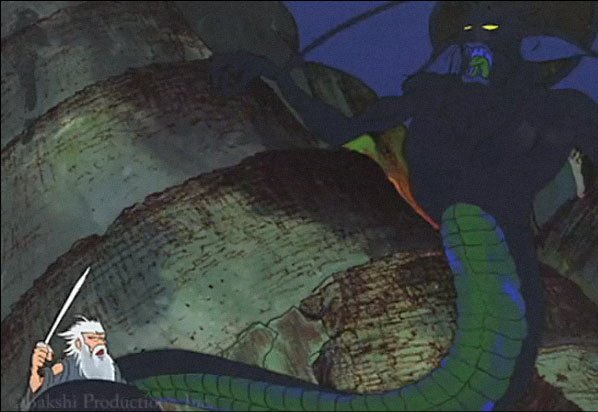
Over at BoingBoing, I posted a short piece about new, previously unseen footage from the love-it-or-hate-it 1978 Ralph Bakshi Lord of the Rings adaptation. Turns out, Bakshi (actually, his son Eddie) has unearthed some unfilmed cel animation art that was never previosuly used. Those drawings have recently been filmed...

Over at BoingBoing, I posted a short piece about new, previously unseen footage from the love-it-or-hate-it 1978 Ralph Bakshi Lord of the Rings adapatation. Turns out, Bakshi (actually, his son Eddie) has unearthed some unfilmed cel animation art that was never previosuly used. Those drawings have recently been filmed, and posted on Bakshi's Facebook page. The two "new" scenes --- which feature the Gandalf and Balrog fight, as recalled by Gandalf later after he's come back from the dead --- are brief. But they are worth looking at, if for no other reason than to revisit Bakshi's visually memorable but flawed movie.
I was lucky to have interviewed Bakshi back in 2006, as well as last week for this post. Bakshi is one of my childhood heroes (along with filmmakers Disney, Lucas and Spielberg), and his Rings was my first ever introduction to Toklien --- and I suppose my gateway drug to D&D.
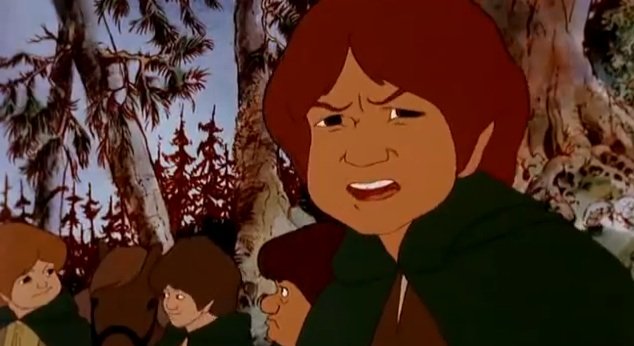 If you recall, Baskhi's film left viewers high and dry about 2/3 of the way through the Tolkien epic. The director never got to make a "part II" to the film, despite the Bakshi version of Rings making money --- $30 million on a $4 million budget, according to Box Office Mojo (though when I interviewed Bakshi in 2006, he told me it cleared $90 million on a $8 million budget).
If you recall, Baskhi's film left viewers high and dry about 2/3 of the way through the Tolkien epic. The director never got to make a "part II" to the film, despite the Bakshi version of Rings making money --- $30 million on a $4 million budget, according to Box Office Mojo (though when I interviewed Bakshi in 2006, he told me it cleared $90 million on a $8 million budget).
When you see the footage, you'll be reminded of some of the troubling differences between the way characters were animated --- sometimes traditionally-animated, sometimes using rotscoping (or tracing live footage for animators to use as a guideline).
I asked Bakshi about this, why specifically in the new footage do Gandalf and the Balrog appear differently, almost cartoonish, compared to the rotoscoped Gandalf and Balrog seen on The Bridge of Khazad-dûm. “Well, it’s hazy," Bakshi, now 75, said, "but I was trying to make memories different than the real time story. I was wrestling with trying to separate the styles.”
Indeed, those days are hazy. But a fun trip to revisit them. Enjoy.
How Dungeons & Dragons and Fantasy Prepare You for Law & Life
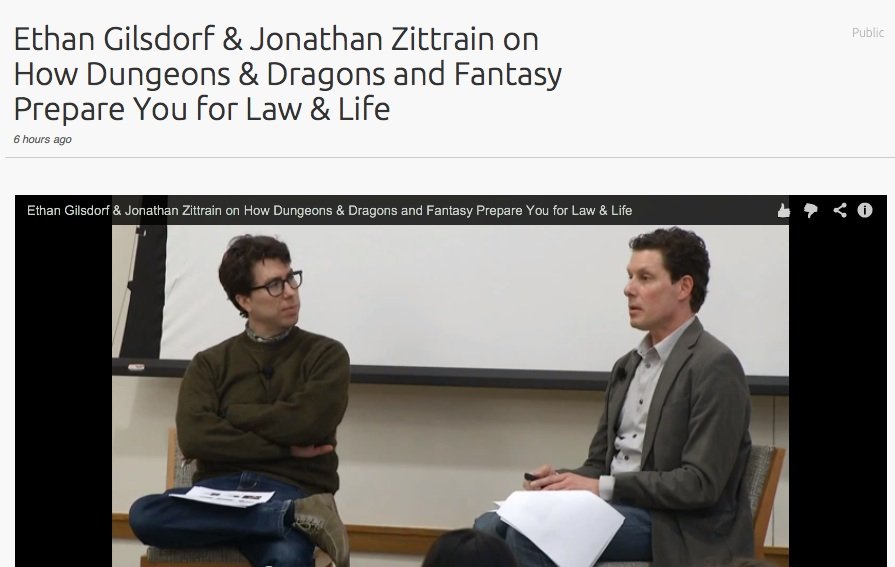

How is a lawyer like a wizard? How does a courtroom resemble an epic battle? How is a casebook like the Dungeon Master's Guide?
In case you missed it, here's the archived video my Harvard University Berkman Center for Internet & Society talk with Jonathan Zittrain "How Dungeons & Dragons and Fantasy Prepare You for Law & Life."
http://www.minds.com/blog/view/291277647059619840/ethan-gilsdorf-and-jonathan-zittrain-on-how-dungeons-and-dragons-and-fantasy-prepare-you-for-law-and-life
Obscene income inequality is immoral
 The current disparity between what executives make vs. rank-and-file employees is nothing short of immoral. But sadly the battle for improved pay equity across America’s workforce isn’t going to be won anytime soon.
The current disparity between what executives make vs. rank-and-file employees is nothing short of immoral. But sadly the battle for improved pay equity across America’s workforce isn’t going to be won anytime soon.
 The current disparity between what executives make vs. rank-and-file employees is nothing short of immoral. But sadly the battle for improved pay equity across America’s workforce isn’t going to be won anytime soon.
The current disparity between what executives make vs. rank-and-file employees is nothing short of immoral. But sadly the battle for improved pay equity across America’s workforce isn’t going to be won anytime soon.
In 2012, CEOs of S&P 500 companies made, on average, an astounding 354 times more than the average U.S. worker, according to the AFL-CIO. The ugly numbers continue. Of some 141 countries, the U.S. ranks fourth highest in “wealth inequality,” trailing only Russia, Ukraine and Lebanon.
But there is hope. Some companies — admittedly, a vast minority — do voluntarily cap their top executives’ salaries. For example, Whole Foods Market won’t pay its CEO more than 19 times the company’s average annual wage.
You can read the rest of my column for WBUR's Cognoscenti here.
Put Down The Camera, Pick Up The Fork

Food — you know that stuff you put in your mouth, chew and swallow to stay alive? — has officially jumped the shark.
 Remember when food was just something you ate?
Remember when food was just something you ate?
Food — you know that stuff you put in your mouth, chew and swallow to stay alive? — has officially jumped the shark.
I’m not exactly sure when it happened. Was it the molecular gastronomy craze of a few years ago, when chefs squirted popcorn and gumdrop foam over your duck breast, and suddenly preparing a meal became a science experiment?
Or was it the proliferation of celebrity cooking and food travel shows, wherein Anthony Bourdain and a crack team of Navy Seals went undercover in Bangkok to bring back a rare mangosteen, then kept it alive in captivity back in his New York City walk-in cooler. (Slight exaggeration, but not so far from the truth.)
You can read the rest of my column for WBUR's Cognoscenti here.
D&D Celebration at Pax East
 I am very excited to present the panel "Why D&D Is Still Awesome: A 40th Anniversary Dungeons & Dragons Tribute" at Pax East in Boston with David Ewalt and Jon Peterson on Sat April 12.
I am very excited to present the panel "Why D&D Is Still Awesome: A 40th Anniversary Dungeons & Dragons Tribute" at Pax East in Boston with David Ewalt and Jon Peterson on Sat April 12. I am very excited to present the panel "Why D&D Is Still Awesome: A 40th Anniversary Dungeons & Dragons Tribute" at Pax East in Boston with David Ewalt and Jon Peterson on Sat April 12.
I am very excited to present the panel "Why D&D Is Still Awesome: A 40th Anniversary Dungeons & Dragons Tribute" at Pax East in Boston with David Ewalt and Jon Peterson on Sat April 12.
Here's the official description:
Why D&D Is Still Awesome: A 40th Anniversary Dungeons & Dragons Tribute
A review of RoboCop 2014: Not as Good as RoboCop 1987
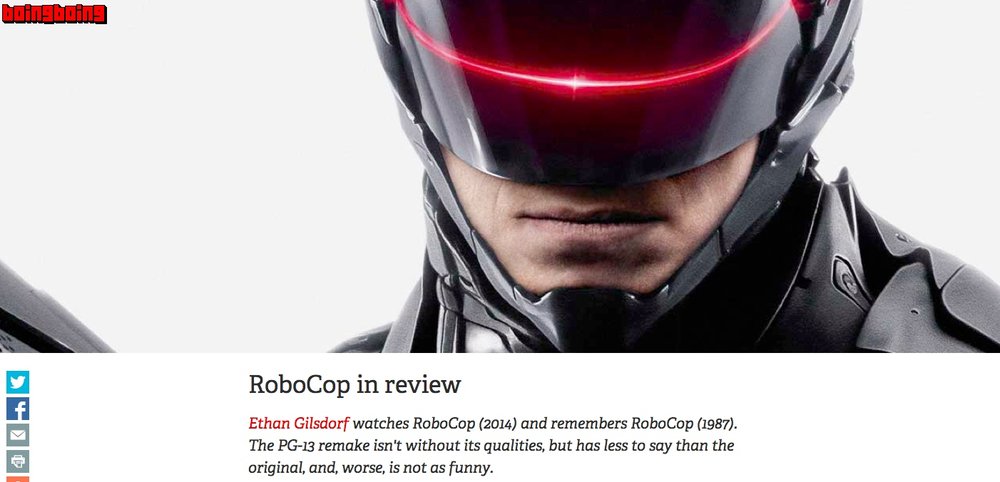
In which I watch RoboCop (2014) and remember RoboCop (1987), and conclude that while the remake isn't without its qualities, it has less to say than the original, and, worse, is not as funny. I also break down the history of our anxiety about robots and A.I., from Metropolis to The Terminator to Her. It's all over at BoingBoing.
Donna Karan, You're Our Only Hope: "Star Wars" Hits Fashion Week
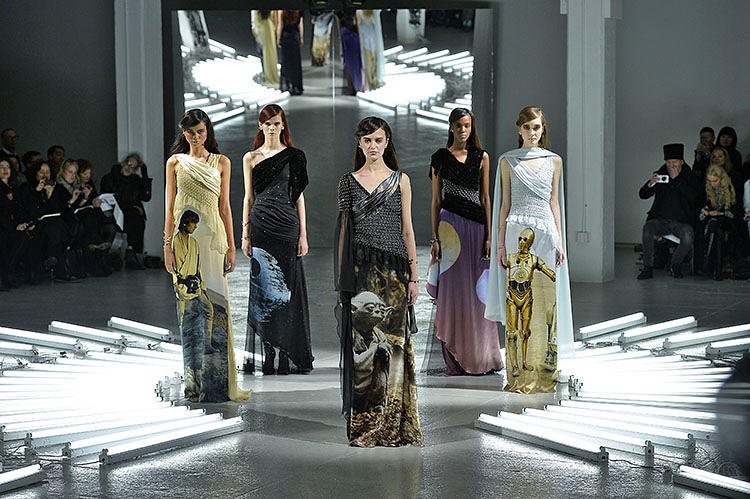 PHOTO BY VICTOR VIRGILE/GAMMA-RAPHO VIA GETTY IMAGESTwiggy runway models wearing gowns encoded with the ultimate geek messaging? Has Star Wars fandom finally, inexorably jumped the shark tank? Perhaps.
PHOTO BY VICTOR VIRGILE/GAMMA-RAPHO VIA GETTY IMAGESTwiggy runway models wearing gowns encoded with the ultimate geek messaging? Has Star Wars fandom finally, inexorably jumped the shark tank? Perhaps.
As noted by our friends over at Fast Company Design, nerdy "Star Wars"-themed gowns --- emblazoned with images of Yoda, C-3PO, Death Star, Luke and Tatooine --- have hit the runaway over at New York's Fashion Week.
The fashion house Rodarte is responsible for producing these gowns for their Autumn/Winter 2014 collection. But ladies, don't expect to be able to wear these dresses at any upcoming ComicCon or Star Wars fan gathering.
"Rodarte designers Kate and Laura Mulleavy, self-described sci-fi nerds, are pals of Star Wars director George Lucas, so the collection had his Jedi blessing," says the Fast Co. Design story. "The bad news is these gowns won’t be for sale--they’ll only be used in editorial shoots for fall and possibly in exhibits."
Me, I'm still holding out for an Arwen 'n' Aragorn fragrance from Calvin Klein.
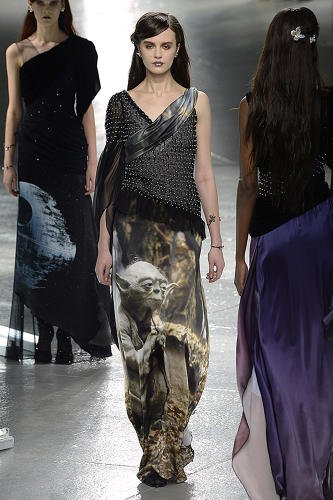 PHOTO BY VICTOR VIRGILE/GAMMA-RAPHO VIA GETTY IMAGES
PHOTO BY VICTOR VIRGILE/GAMMA-RAPHO VIA GETTY IMAGES
D&D on the BBC
 My D&D world tour continues in the UK. I was fortunate to be interviewed by the BBC's Radio 5 "Up All Night" host Adam Rosser with authors Mark Barrowcliffe (The Elfish Gene) and Jim Swallow (author of numerous Star Trek, Doctor Who books). Included in this retrospective about D&D and its 40th birthday, there's also a segment with Ian Livingstone (co-founder of Games Workshop). You can listen to the archived Feb 5 show here: http://www.bbc.co.uk/programmes/b03szml0. Click the big arrow and bump the episode up to around the 02:13:15 mark, which is where the D&D segment begins. (I think this link will be up for a little while. Let me know if the link is dead and I'll try to find the archived show elsewhere.)
My D&D world tour continues in the UK. I was fortunate to be interviewed by the BBC's Radio 5 "Up All Night" host Adam Rosser with authors Mark Barrowcliffe (The Elfish Gene) and Jim Swallow (author of numerous Star Trek, Doctor Who books). Included in this retrospective about D&D and its 40th birthday, there's also a segment with Ian Livingstone (co-founder of Games Workshop). You can listen to the archived Feb 5 show here: http://www.bbc.co.uk/programmes/b03szml0. Click the big arrow and bump the episode up to around the 02:13:15 mark, which is where the D&D segment begins. (I think this link will be up for a little while. Let me know if the link is dead and I'll try to find the archived show elsewhere.)
Looking For ‘Likes’ In All The Wrong Places
 (image: AP)Does "like" = "love"? Feel a little beat up by social media sometimes? My essay about this topic, "Looking For ‘Likes’ In All The Wrong Places: On Social Media And Self-Worth," appeared on WBUR's Morning Edition, Mon Feb 4. Here's an excerpt, and you can listen to the piece I recorded below.
(image: AP)Does "like" = "love"? Feel a little beat up by social media sometimes? My essay about this topic, "Looking For ‘Likes’ In All The Wrong Places: On Social Media And Self-Worth," appeared on WBUR's Morning Edition, Mon Feb 4. Here's an excerpt, and you can listen to the piece I recorded below.
 (image: AP)Does "like" = "love"? Feel a little beat up by social media sometimes? My essay about this topic, "Looking For ‘Likes’ In All The Wrong Places: On Social Media And Self-Worth," appeared on WBUR's Morning Edition, Mon Feb 4. Here's an excerpt, and you can listen to the piece I recorded below.
(image: AP)Does "like" = "love"? Feel a little beat up by social media sometimes? My essay about this topic, "Looking For ‘Likes’ In All The Wrong Places: On Social Media And Self-Worth," appeared on WBUR's Morning Edition, Mon Feb 4. Here's an excerpt, and you can listen to the piece I recorded below.
We all know the feeling.
We post something on Facebook, say our latest gastronomical experiment, or a scathing takedown of a celebrity making a fool of himself. Or, we let fly a clever tweet paired with a shrewd hashtag we’re certain is going to go viral.
Then, crickets. As in, no “likes,” no retweets, no nothing.
And how does all this make us feel? More insignificant than if we’d posted nothing at all.
That’s the power, and danger, of social media.
You can read the rest here. And listen below.
Five Amazing TV Moments from D&D History
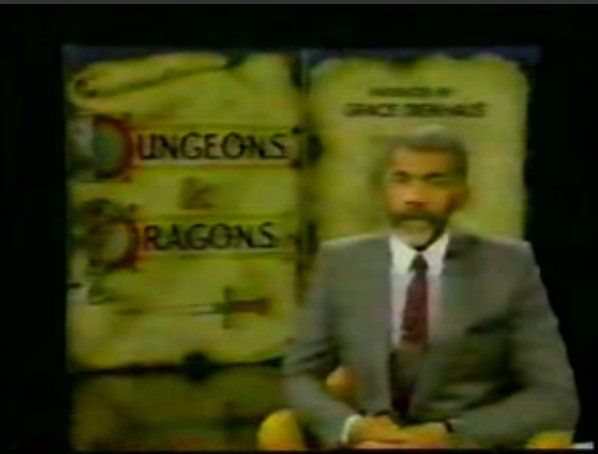 A look back at Five Amazing TV Moments from D&D History.
A look back at Five Amazing TV Moments from D&D History.From Gary Gygax defending D&D on 60 Minutes, to Tom Hanks in the TV movie Mazes and Monsters, to the famous Freaks and Geeks “Discos and Dragons” episode featuring James Franco as the bad-boy who plays D&D with the A/V nerds ... here's a look back at Five Amazing TV Moments from D&D History. In these clips, we see the how the famous game has been portrayed, from being ridiculed and used as a scapegoat to being celebrated. You can read the rest of my post on GeekDad.
